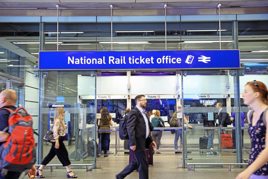The Great British Rail Sale (GBRS) returned last week. Running from January 23, the week-long sale promised to slash rail ticket prices over six weeks, tempting non-habitual rail customers to its services through discounted prices. An advance single from Birmingham International to Bristol Temple Meeds could be found reduced from £30.60 to £15.30 via CrossCountry, though not all routes were covered.
Now in its second year, the industry initiative sought to bring train operators across England and Wales together, offering up to 50% off selected Advance, and Off-Peak tickets. The discounted fares from the 19 participating train operators had to be purchased at least seven days in advance of the date of travel, for use between January 30 and March 15, 2024.
DfT and train operators were keen to promote the event, which the Great British Railways Transition Team (GBRTT) estimates last year attracted 70,000 customers to the railways who hadn’t travelled since the pandemic. Comments received on their social media feeds seemed less encouraging however, as some vented their frustrations on rail services being over capacity and non-punctual, with others considering the possibilities of cancellations through engineering work, failures, or strike action, questioning if the tickets they purchased could even be used at all.
The National Rail website stated that customers who had purchased a ticket before the strikes were announced ‘may be able to use the ticket on an alternative day’, although a seat couldn’t be guaranteed, leaving customers to seek advice from the website of their operator.
Speaking at the Rail 100 breakfast meeting in London on January 25, Editorial Chairman of Rail Review, Sir Michael Holden said, “This has been sold as a national rail sale, which it isn’t,” citing as an example that he could purchase discounted tickets on journeys from Wokingham, but not Woking.
“It’s another thing that’s adding to the complexity of fares and fragmentation, at the very time the market is calling for a simplification to make it easier for people to get onto the railway,” he added.
The DfT said that over a million GBRS tickets were available on a first-come, first-served basis, with no limit per customer on the numbers purchased, with National Rail explaining that ‘discounts were made available on trains and routes that have more capacity.’
With eyes firmly on non-commuter customers, operator C2C’s Rob Mullen explained that tickets could be used to “help beat those winter blues by taking a trip into London, spending a day shopping at Lakeside (Chafford Hundred) or enjoying a seafront walk along the Thames Estuary down in Southend-on-Sea.”
Though the incentive brought many operators together with the aim of attracting more customers to rail, there appears to be work ahead for the rail industry in improving public perception.















Login to comment
Comments
No comments have been made yet.